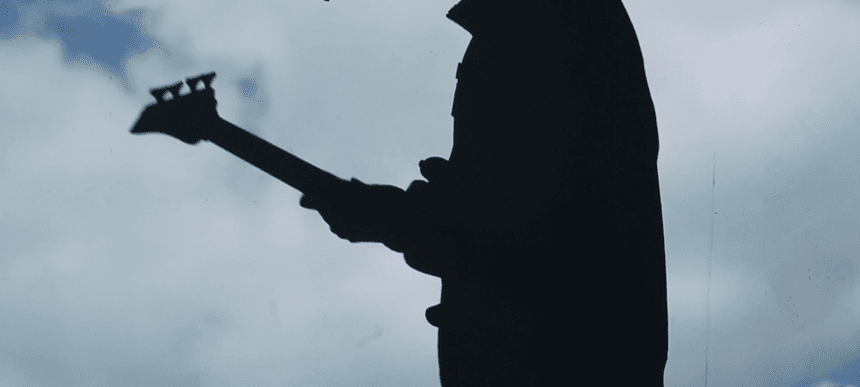
James Ferraro: "The amount of burning Priuses that I’ve seen in L.A. is pretty strange."
Across dozens of boundary-pushing CD-Rs, cassettes, mixtapes, and LPs, James Ferraro has established himself as one of the most singular voices in underground music today. Some of his best releases – like his celebrated, hyper-conceptual 2011 album ‘Far Side Virtual’ – have proven to be hugely influential within the experimental community, opening up new ideas and possibilities for other artists to explore.
Ferraro’s vast discography has included everything from lo-fi guitar improvisations to hi-fi electronic compositions to cut-‘n’-paste sample collages, but in recent years he’s returned to somewhat less abstract sound world. His last album, 2013’s ‘NYC Hell 3:00AM’, favoured more traditional songwriting, orchestral touches, and a greater presence of Ferraro’s own vocals to achieve its bleak, isolated sound. His latest album ‘Skid Row’ feels like a spiritual successor to that album, continuing in the same vein stylistically but pushing the vocals even closer to the front and introducing a larger range of instrumentation. Where it differs is the location where the action takes place: where ‘NYC, Hell 3:00AM’ took place in post-9/11 New York, depicting the city as an icy and desolate open sewer, ‘Skid Row’ switches its focus to early-‘90s Los Angeles. The whole album feels basked in a warm orange glow, like the sun setting in the smog over the Hollywood Hills while the Rodney King riots and the O. J. Simpson trial blaze below.
Following some tour dates with his pal Oneohtrix Point Never, Ferraro spoke over the phone about the genesis of the album and his relationship with L.A.
Are you still living in New York?
James Ferraro: “I’m not, actually. I live in L.A. I’ve lived here for about four or five years – people are always getting that mixed up.”
So does that mean you wrote ‘NYC, Hell 3:00AM’ while you were still living in L.A.?
James Ferraro: “I actually wrote that one in New York. That record kind of came together in a looser way. I was travelling back and forth, but it was recorded in New York. I wanted to keep it in that setting. I’m actually planning on redoing that album.”
Why’s that?
James Ferraro: “It became one of those things that’s out there and kind of haunts you because it didn’t exactly come out the way you wanted it to, if that makes sense. I want to go back to it and redo it and put it back out how it was meant to be. The concept had been in my head for a long time, and just due to the nature of labels and how they engage, the first version of it was sort of… not rejected, but disputed. I had to modify it, I guess, but that never sat with me completely. So I want to go back to it and do it exactly as it was intended to be.”
What parts of it do you feel didn’t work?
James Ferraro: “In itself it’s fine, it’s just not completely how I wanted it to end up like. It was intended to be much more like an orchestral work – like, completely. It wasn’t able to lift off in that direction, just for not having that kind of support from the label.”
"The amount of burning Priuses that I’ve seen in L.A. is pretty strange. I’ve seen a lot of them." – James Ferraro
Speaking of which, ‘Skid Row’ has a lot of orchestral touches as well as live instrumentation like guitars and more prominent vocals. Why did you gravitate towards those sounds?
James Ferraro: “The vocals speak to the mood of isolation that occurs within cars. It's like an inner monologue, and the instrumentation is there for emotional elevation. Cars are a really prominent part of L.A.'s ecology. Car life, and seeing things from behind car windows. I think I used strings in a more or less traditional way to pull out certain psychological colouring and emotional elevation, in contrast to the guitar wash, repetitive evening news, and other metallic detritus-like textures which reflect more on stress and tension or violence. The strings are like an emotional evaluation of it all.”
How did you end up writing an album about Los Angeles?
James Ferraro: “I’ve always wanted to make ‘Skid Row’, I guess it was just when the time felt right. The thing with me is that ideas just fester in my mind and then eventually brew over until it’s like ‘This has to become an album’ – or an object of art in some sense.”
What ideas did you have?
James Ferraro: “It’s more an impression of an environment that calcifies into being an album – the feeling that Skid Row portrays, probably even since I was a kid. So it’s gathering all this different data you get from being in an environment, and then sculpting that into a work.”
What sort of data do you mean?
James Ferraro: “Things about L.A.’s relation to the media – its history, as dramatized by the media. Stuff like the L.A. riots and the O.J. Simpson trial, seeing random car accidents on the side of the freeway, things like that. It’s collecting all that information and processing it into certain metaphors and then presenting that in a piece. For instance, the amount of burning Priuses that I’ve seen in L.A. is pretty strange. I’ve seen a lot of them. I started to wonder about it being a metaphor, a symbol of American individualism in relation to consumerism, and how that’s affecting climate change, and what people purchase to combat that on a personal level. A burning Prius then becomes this kind of failed optimism. You see these symbols and these allegories being played out within the landscape in L.A. When there were enough of those [ideas] catalogued in my brain, that’s when I went into making ‘Skid Row’.”
When did you first go to L.A.?
James Ferraro: “It must’ve been in the early ‘90s. My father always lived in L.A. when I was a kid, so I was bounced to L.A. in the summer and then returned to New York in the school year. My first memory is actually of my dad’s brother, who used to play in a hair metal band. We used to go visit him in Hollywood. It was just extremely ‘Hollywood’, if that makes sense – really bombed out, a lot of speed users. At the time, metal was still the prominent culture musically and identity-wise. We went to visit him in his studio apartment and he pretty much played us all the music he was working on at the time. That was probably my first memory. I also remember as we were driving, behind us was this huge monster truck filled with all these neo-Nazi skinheads. I mean, they were teenagers – it was crazy – but they were just sporting a look, you know what I mean? I remember being shocked by that. And also [another memory was] just seeing all the tropes of L.A. that you recognise from films just being played out right in front of you. I remember seeing graffiti. It was really stimulating at the time.”
"My first memory [of L.A.] is actually of my dad’s brother, who used to play in a hair metal band. We used to go visit him in Hollywood. It was just extremely ‘Hollywood’, if that makes sense – really bombed out, a lot of speed users." – James Ferraro
I’ve seen a lot of articles about the gentrification of Skid Row that’s going on right now. What are your thoughts on that?
James Ferraro: “I dunno. There’s a lyric in Thrash & Escalate where it says Yuppie believers sleeping in the sewers. It references someone gentrifying an area and obviously rebuilding it. I think it’s just a natural process. Gentrification obviously has all these social and political things surrounding it, but I think it’s like reverse white flight – it’s people from the suburbs moving back into these concentrated urban areas. It’s a longer process than someone being born in a certain year than when that neighbourhood had a different identity, you know what I mean? It always switches and changes. ‘Skid Row’ kind of touches on that for sure, but I feel like the overall scope of it is this bird’s eye view of Los Angeles.”
Is the album something that looks at the city through contemporary eyes, or is the album more about events like the 1992 riots and the O.J. Simpson trial?
James Ferraro: “I think it’s about both. If there’s a link between the two, it’s about how the news and media dramatizes events. Obviously there’s the parallels with the L.A. riots and something like Ferguson – there’s a connection there which I think is pretty valid – but the focus is really on the dramatization and the simulacra of events once it’s filtered through the media and put forward in this hyperreal way. It’s kind of obvious how the news, especially American news, follows that dramatic framework – that three-part story arc framework. It becomes a story and the actual event becomes diminished, so there’s a third event that happens – the spectacle of it. It becomes a separate event. The actual event becomes diminished and starts being perceived by how it’s reported. I just find that really interesting.”
You were obviously quite young when things like the riots happened. What are your memories of those events?
James Ferraro: “I remember seeing the Rodney King home video beating on T.V. I remember adults being around T.V. talking about it. And I remember there being this sort of energy around it, that this was different to just watching a primetime sitcom or something. There was a little more tension; adults seemed a little more worked up. I remember the visuals too – I was at my grandma’s house and there was this huge old wooden T.V. It was just the lexicon for a while. It was something people referenced pretty easily. That’s the thing about L.A. – it’s still referenced in the actual behaviour [of people]. You see the actual shell-shocked nature of what these things have done to L.A. It sheds a light on a certain character of the environment. It’s the same thing with 9/11 – people wear ‘Never Forget’ beanies and World Trade Centre t-shirts. There are reminders everywhere. In that sense, it’s just kind of encoded in the behaviour of people in L.A. I was thinking that it’s like a pin could drop and a riot would break out, there’s so much tension. And I don’t mean that super literally – I mean there’s this quivering membrane of fear that everyone indulges in together.”
"I think of smog as the choir in the play that is L.A." – James Ferraro
‘Skid Row’ presents the uglier side of Los Angeles, but what's your relationship with the city like personally?
James Ferraro: “I really like it. I think presenting the ‘ugly’ side of things isn’t really a negative thing. Obviously it’s a bummer to see certain fucked up things like Skid Row in L.A., but it’s also part of it. I’m not really one to escape completely. It’s different spectrums of humanity: over there it’s this artificial air-controlled golf course, and over here it’s the bombed-out junkie village. It all speaks to each other; it’s all in the same conversation. So for me it’s not ugly, it’s just reality. I find that beautiful.”
Lastly, when I say ‘smog’, what do you think of?
James Ferraro: “I think of it like the choir of L.A. It’s the thing that presents itself at every act. It’s an update of what’s going on in the story. The smog is like a weird sort of narration on its own, you know, the activity of L.A. I think of smog as the choir in the play that is L.A.”
Break World Records released 'Skid Row' on November 13th 2015 (buy).













